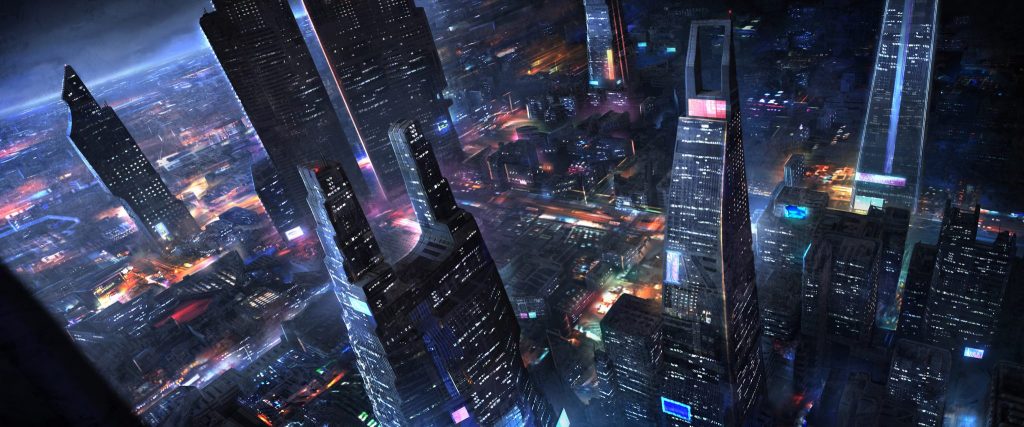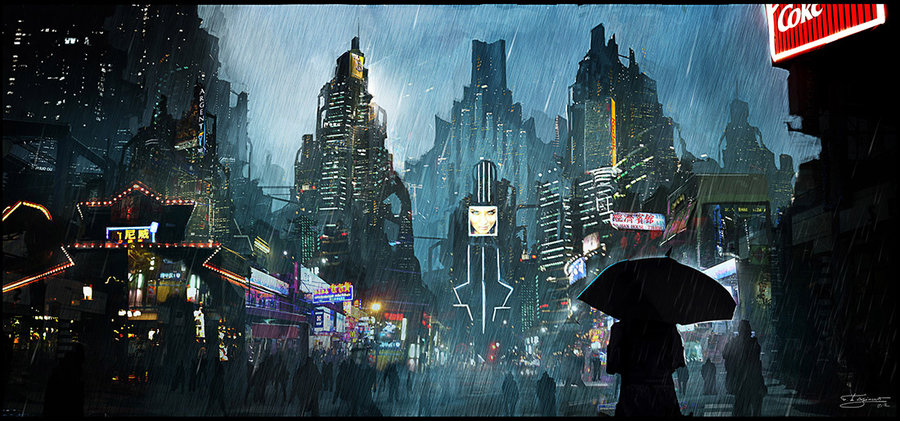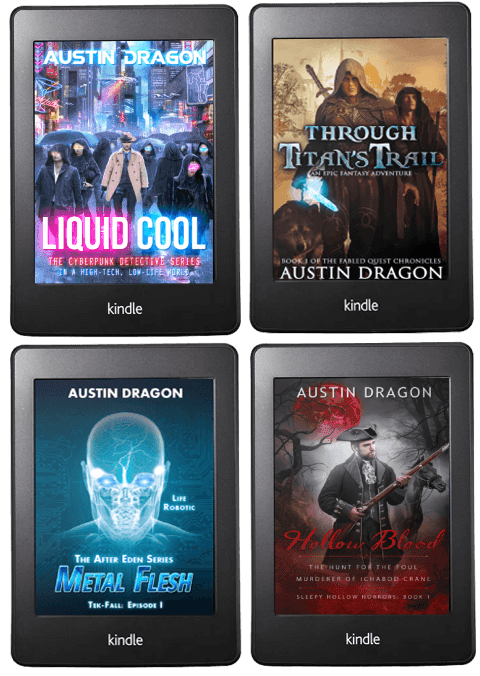Yes, I’m writing a new science fiction series in a sub-genre called cyberpunk. Authors like Philip K. Dick and William Gibson are the most famous; the singular greatest movie of the genre is Ridley’s Scott’s classic Blade Runner from 1982. A few months back, I surveyed my own list of readers and fans to be surprised by the interest in cyberpunk science fiction. In fact, I was surprised by how much the genre is still regarded when its golden years, at least in Hollywood, ended back around 1985—that’s thirty years ago now—though interest exploded again with the Matrix trilogy, but the first Matrix movie was sixteen years ago!
Why the interest in this category of science fiction? Until it came on the scene, most of the science fiction was utopian, “Star Trek-ian,” man and society evolving into something better. To many, even the fans of Star Trek, that seemed wishful thinking, at best. Remember that back in the ‘80s we were still in the Cold War—America versus the Soviet Union. Science fiction writers can show us the hopeful, but they can also show us versions of the likely, or what they feel to be likely based on the current society. Enter cyberpunk and dystopian science fiction.
The darker side of science fiction is not new. Mary Shelley gave us the first science fiction novel with Frankenstein in 1818 and it was a dark and frightening one. Classic science fiction on television like The Twilight Zone and The (original) Outer Limits more often than not showed very dystopian futures and science (or man) gone awry. But cyberpunk gave us a new twist that endeared not only me, but millions of others and has never completely gone away.
With my new cyberpunk series, I put my own twist on the sub-genre. How? Construct a future from the current time into a cyberpunkish future? Nope. That’s not particularly creative in my mind. I wanted to re-imagine cyberpunk not as a writer in the ‘80s projecting out to 2015 and beyond. I would be a writer from that 2015 and beyond, pretend I was back in the ‘80s, and write a different dystopian future. Here’s a list of the signature elements of the old cyberpunk and how my new cyberpunk series will be different and refreshing:
1) Old = Mega-corporations. New = Mega-corporations and Uber-governments.
This has not only been a staple of cyberpunk, but many books and movies, especially conspiracy ones. The ubiquitous, all-powerful megacorporations controlling governments or replacing them altogether. Well, this is not the ‘80s and it’s okay to feature the dastardly megacorporation like the Weyland Yutani Corporation from the Alien movies, but we’re missing the big, fat elephant in the room—government! My series has its own “Cold War” but the antagonists are mega-corporations and uber-governments—both vying against each other for ultimate control. But interestingly, there are many people fighting to make sure neither one ever does.
2) Old = Japan rules the world. New = Heavy Asian influence, including cool samurai swords.
Back in the ‘80s, there was also something else happening on the economic stage: the rise of Japan as a major economic global power. The first Die Hard movie, Rising Sun (Michael Crichton’s blockbuster book that became a mediocre movie), and Gung Ho. Americans really did think Japan was going to take over economically and cyberpunk seemed to incorporate this fear. Japan plays a major role in my series because of specific business ventures. But the world of my series will read more like that of the old accounts of the New York urban, ethnic melting pot with one ethnic group dominating specific areas or industries, including China-Town and Old Harlem. As for Japanese samurai swords, they’re just cool so they’re in.
3) Old = Digital rules. New = Analog versus digital.
Much of the science fiction of that era was very prophetic. The big thing they missed was the pervasiveness of the cell phone/smartphone, but no one could predict Steve Jobs so that can be forgiven. Also, since those writers were in the dawn of the computer age, they correctly foresaw past the Analog Age to the Digital Age, even if their view of digital was stuck in an old Atari game framework (a la the movie Johnny Mnemonic). The power of digital technology is quite astonishing, but so have the dangers. Hackers have gotten into the credit card records of major companies and even into the secret systems of the United States government–including the White House! Though the debate is over, we are in the digital age and we’re never going back to the analog age, but my series will do an interesting thing. It will have both technologies in its world fighting it out in the consumer marketplace and will provide a means to have some poignant examinations of technology as it relates to our daily lives.
4) Old = Robots, cyborgs and synthetic humans. New = No synthetic humans, but robots and cyborgs galore.
In the next book of my current After Eden series, there will be a scientific group that sets out to prove beyond the shadow of a doubt that there is no God. They end up (according to them) doing quite the opposite. In cyberpunk stories, man is able to create biological humans and androids indistinguishable from actual humans. Man is also able to create robots with such advanced artificial intelligence that they inevitably have to be classified as sentient beings. I personally believe we never will be able to create life. Unfortunately, I believe we will be able to cheat and create all kinds of things that we shouldn’t and will pay a heavy price for it. Futurist and theoretical physicist Michio Kaku said it best when he described our most advanced robots as having “the intelligence of a retarded cockroach.” On the machine side, we will continue to advance, but to get to the point of sentience, I think not. That is not to say that we won’t turn over large parts of our life to some version of artificial intelligence—oops, oh wait, too late, we already do—and will continue to expand that. We will also advance our cybernetic technology. I do look forward to that day when we can say we’ve eliminated paralysis, blindness, and deafness from the world. Yes, we will achieve those things. “Brain-reading” technology is science fact, not science fiction anymore. But plugging brains into machines and downloading a person’s life essence into a robot will remain science fiction. In my cyberpunk series, they spend no time on notions of creating life, but in the practical (and profitable) realm of improving life through technology, especially mechanical. The “higher end” fixes involving genetic engineering and manipulation is reserved for the upper class.
5) Old = Flying cars. New = Well, yeah!
There are many, many reasons why even if we could make the technology economically sound that we would never have the flying cars as seen the Fifth Element movie or any of the Star Wars films. For one simple word: terrorism. In my new series, they find a way to make it feasible for the simple reason that they have no choice. They are just too many people packed into their urban cities that roads have to be the skies. There are also other peculiarities of their metropolis that make this path the one their society embraces which doesn’t apply to us.
6) Old = A dark and rainy world. New = Same, but for different reasons.
The movie Blade Runner has done more to burn an image of an authentic cyberpunk world into our minds than any other. It’s strange because the movie was not a box-office success when it was first released, but became the cult classic from video and DVD rental stores (remember those). I keep this tenet but the reasons are different. In cyberpunk stories of old, the dark skies and constant rain speak to environmental damage of us humans. In my series, the reasons are quite different and have nothing to do with environmental catastrophe but from millennium old struggles of social class.
But even separate from the reason for the look of a cyberpunk world is the fact it fits the cyberpunk underlying theme of “high tech and low life” – a slummy, grimy, neo-noir landscape where the powerful lord over the powerless masses below.
This is all part of the world of my upcoming cyberpunk detective series. Name reveal coming soon as well as the amazing cover!
If you aren’t already a VIP member, sign up to my list HERE and get the ebook prequel along with two other novels FREE.
#Cyberpunk #ScienceFiction #BladeRunner
What do you think about my “Cyberpunk Reimagined” World of Liquid Cool?

Austin Dragon is the author of over 30 books in science fiction, fantasy, and classic horror. His works include the sci-fi detective LIQUID COOL series, the epic fantasy FABLED QUEST CHRONICLES, the international futuristic epic AFTER EDEN Series, the classic SLEEPY HOLLOW HORRORS, and new military sci-fi PLANET TAMERS series. He is a native New Yorker but has called Los Angeles, California home for more than twenty years. Words to describe him, in no particular order: U.S. Army, English teacher, one-time resident of Paris, ex-political junkie, movie buff, Fortune 500 corporate recruiter, renaissance man, futurist, and dreamer.
LATEST RELEASE: THE OFFICIAL FABLED QUEST BESTIARY






265 Responses
Looks awesome !!!
So excited,another wonderful story from a fantastic author 😊
looks interesting
you a re new author and would like to ask you some question what made you do this type of boos and do you have swag on the book i love color of the book
Haven’t read it but would love too